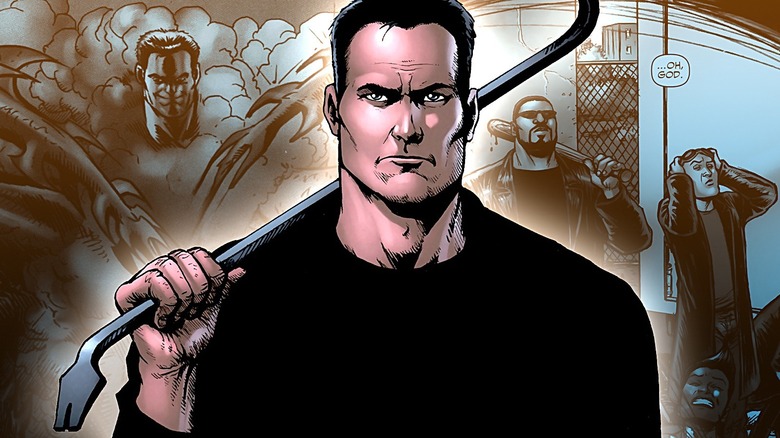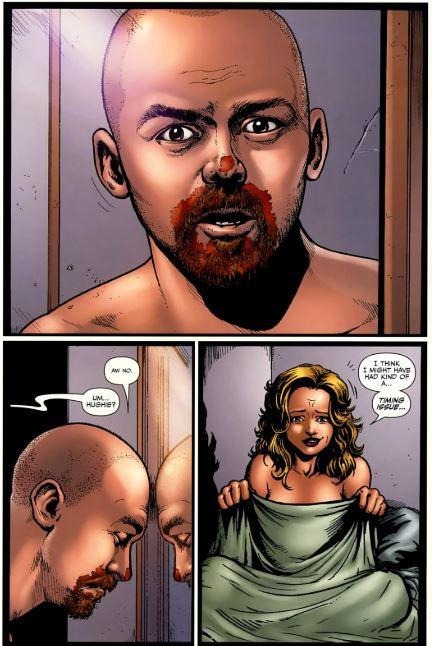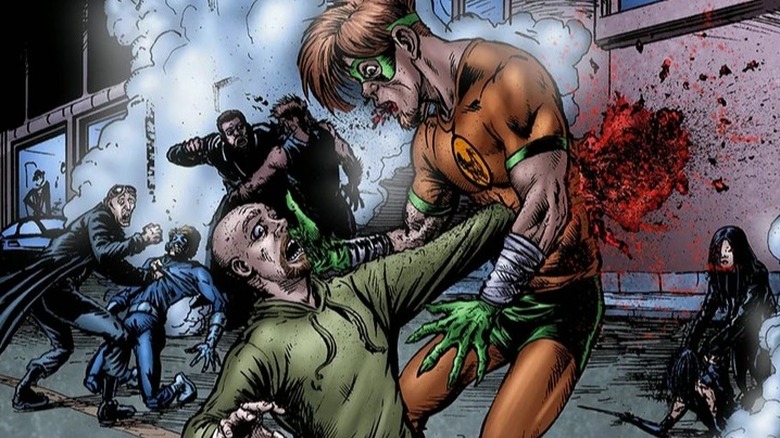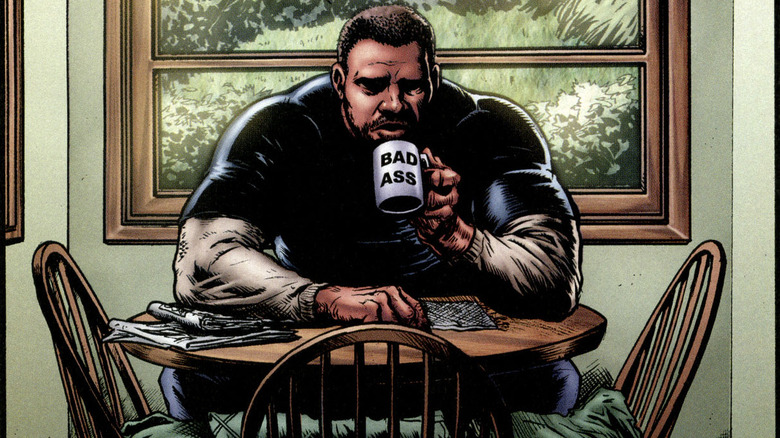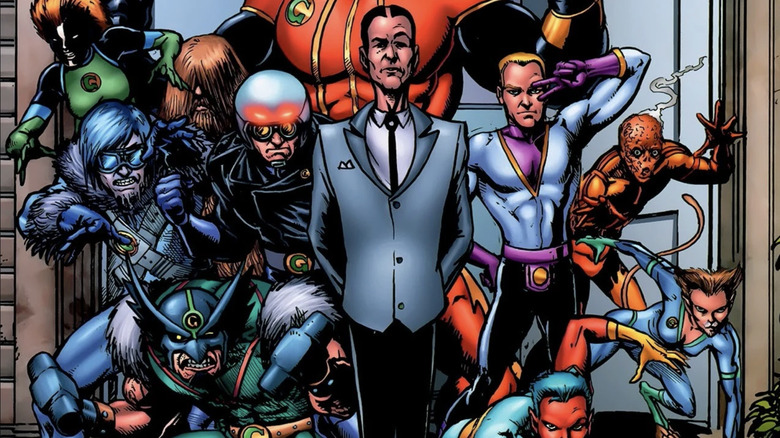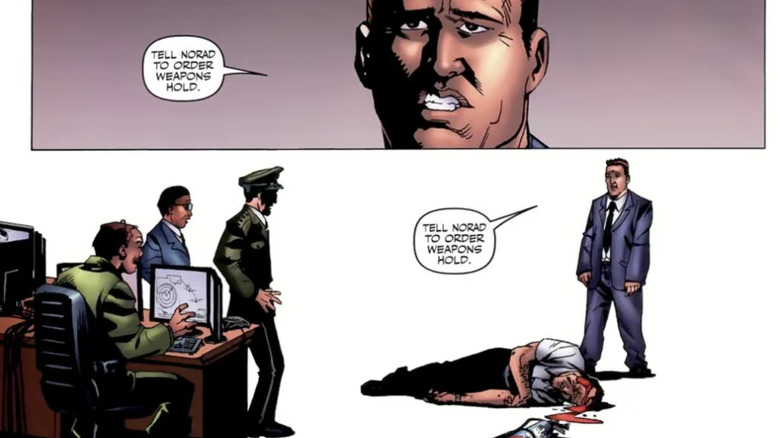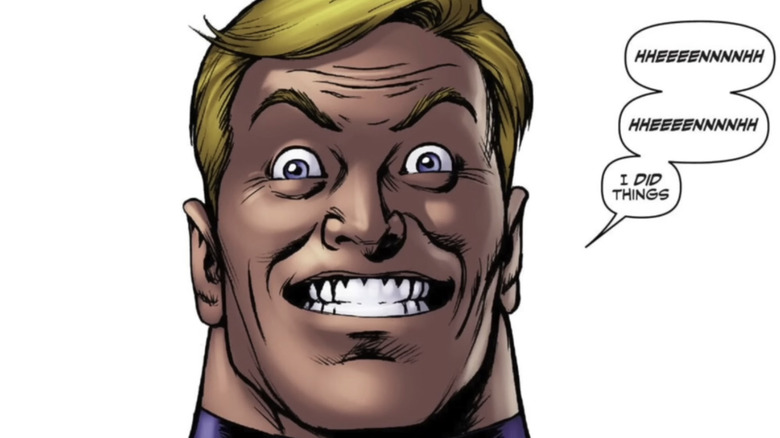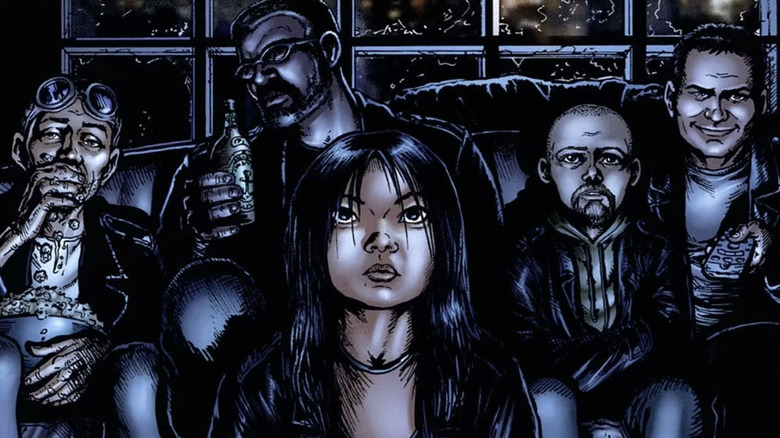The Most Controversial Moments Of The Boys Comic Book Series
We may receive a commission on purchases made from links.
If you think the TV series version of "The Boys" crosses the line, wait until you read the original comics by Garth Ennis and Darick Robertson.
Ennis writes about things he hates getting raked over the coals. "Preacher" is an enormous middle finger to organized religion, particularly Christian fundamentalists. When Ennis wrote "The Punisher MAX," he had Frank kill IRA terrorists, human traffickers, and Enron executives. Ennis' disdain for corporate America also leads us to "The Boys," which also let him vent about how ridiculous he thinks superheroes are, following in the footsteps of Pat Mills and Kevin O'Neill's comic "Marshal Law."
The "Boys" comic is more episodic than the show; it's divided into arcs about the Boys fighting one particular superhero team, then moving onto the next as they climb up the ladder towards the Seven. This avoids some of the show's pacing pitfalls (why haven't Butcher or Homelander killed the other one yet?) and ensures no Marvel or DC brand is spared from Ennis' pen of parody.
It's also a difficult read. The Boys are all more hardened and heartless, and even Hughie ain't the innocent nice guy he is in the show. Starlight is a naive Christian farm girl, not the assertive moral center that Annie (Erin Moriarty) was rewritten into for the show. Even some of the Supes, including A-Train, show a capacity for redemption that's totally absent in the comics.
In general, "The Boys" comic has a lot more sex and nudity, which sometimes overlaps with its gross-out humor. (The morning after Hughie and Annie's first night together, he wakes up with blood staining his beard from going down on her.)
If you think that's icky, get over yourself — especially since there's a lot worse in store. Some of these moments, from the terrifyingly vile (Starlight being assaulted during her first day with the Seven, Homelander letting a passenger plane die after he screws up the rescue attempt) to hilariously disgusting (Tek Knight's compulsive need to screw any hole he sees), appear in the show. This time, we'll be sticking with comic-exclusive moments.
The Death of Blarney Cock
Garth Ennis' comics are mostly a critique of machismo. Take Butcher's final advice to Hughie in the last arc of "The Boys" — "All that macho s**t, that gunfighter, 'Dirty Harry' bollocks — it looks tasty, but in the end it's f**kin' self-defeatin'. It just leaves you with bodies in ditches an' blokes with headfuls of broken glass. Men are only so much use, Hughie. Men are boys."
But since Ennis does find the tough guy act "tasty" despite himself, he sometimes can't help indulging himself with the attitudes of his leads. That results in a fair bit of cringe humor homophobia throughout "The Boys." See also: Herr Starr in "Preacher" and his hang-ups about enjoying anal sex.
The second arc of "The Boys" is titled "Cherry" (because Hughie's Supe-busting one gets popped), where the Boys face off against the Teenage Kix (read: the Teen Titans). In the show, Hughie's first kill is Translucent (Alex Hassell), who has an explosive jammed up his behind to get past his diamond hard skin. Hughie's cherry-popping in the comic is different, but packed with similar gross out humor.
Comic Hughie's first victim is Blarney Cock, a teen Supe and Queen Maeve's estranged son (notice their shared Irish names). Hughie, who's jacked up on Compound V and doesn't know his own (super) strength, punches right through Blarney Cock's chest. The rest of the Teenage Kix hightail it out of there, leaving the Boys to discover a surprise in Blarney Cock's corpse: a hamster, bound and stuffed up the dead Supe's behind.
This is a case of "Gerbilling," a myth from a less tolerant time that gay men (especially supposedly closeted male celebrities) would stick rodents up their asses for pleasure. It gets worse — when Blarney Cock is revived as a half-braindead zombie, he seeks out Hughie. Not for revenge, but because Hughie adopted the hamster (named Jamie) and he still wants to use it.
"The Boys," both the comic and the show, often use sex and kink as shorthand for depravity. This case shows how that "get a load of these sick freaks" attitude can easily overlap with homophobia.
Mother's Milk's family
When Ennis tries to be edgy, he sometimes looks back around and reasserts conservative stereotypes. See how he handles the home life of Mother's Milk, the only Black member of The Boys.
Ennis' original pitch described MM as the closest thing to a true hero on the Boys; he's the adult in the room, as smart and capable as Butcher without his sadism or cheeky humor. The show takes it a step further by giving him a stable life off the job; before he rejoins the Boys, he's become a social worker at a corrections facility and he's married to a woman named Monique with a young daughter, Janine.
In the comics, though, MM and Monique are long divorced. She's a crack addict who once kidnapped Janine and MM doesn't want her in his daughter's life. Comic Janine is a few years older than the show (a teenager instead of a grade schooler), so she's naturally feeling rebellious; late in the comic's run, her mother ropes her into shooting incest porn together.
Comic Monique is like a Republican fever dream of what an "urban Black mother" looks like. In issue #2, Butcher has a talk with Janine and tells her to respect her father, a bizarrely pro-traditional authority moment for an Ennis comic.
John Godolkin's abuse of the G-Men
Volume 4 of "The Boys" — "We Gotta Go Now" — is about the Boys infiltrating and destroying the G-Men. As you can guess, these are Vought's version of the X-Men, "the world's most popular outcasts." (Their founder is named Godolkin, not Xavier, hence the different letter affixed to their name.) It's also the nastiest of the comic's A-List superhero parodies.
The G-Men are described as Vought's biggest moneymaker and most prolific superhero franchise, with several spin-off teams like G-Force and G-Whiz. This reflects the bloat of X-Men comics and teams since in the 1990s, but there's a darker reason too.
The X-Men has always had a nominal school setting, with the original premise being that Professor X took in the five teenage X-Men to teach them how to control their powers. "We Gotta Go Now" leaps to how a sick mind might read the story of "middle-aged man takes in a group of teenagers, then dresses them up to his liking."
Godolkin is a pedophile who has groomed and molested all the G-Men. He's brainwashed them, but not with any psychic powers like Charles Xavier has. The constant new recruits and expanding roster of new young heroes? Godolkin keeps kidnapping children to be his next victims; he steals their old identities, injects them with Compound V, and passes them off as Supe orphans he generously adopted.
After the Boys discover the truth, Vought cuts their losses and sends in its private army to kill all the G-Men. (In Garth Ennis comics, soldiers always beat superheroes.) James Stillwell, the soulless Vought executive who manages their superheroes, even has the freshly-abducted, not yet indoctrinated newest generation "Pre-Wiz" killed. Ennis' disgust with real men like both Godolkin and Stillwell could not be more obvious, and Pre-Wiz's fate is there to underline how monstrous they are — but it still plays a bit too much like a cruel joke.
Vic The Veep's whole character
"The Boys" TV show is basically our history with superheroes painted on, while the comic leans more into an alternate history.
In this alternate history, George H. W. Bush's vice president was Robert "Dakota Bob" Schaefer, a former Haliburton executive who was then elected president himself in 2000. Dakota Bob's VP is Victor Neuman, the former CEO of Vought. Yes, this is the comic counterpart to the show's head-popping politician Victoria Neuman (Claudia Doumit), but Vic The Veep is nothing like the cunning, in-control Neuman of the show.
Vic is implied to have a mental disability of some kind; he talks like an infant, unable to string a single sentence together without rehearsal from his handlers. That doesn't stop him from being a violent, Supe-worshiping sex addict though. (His Secret Service detail has to slip his condoms on since he can't himself.)
The joke about 2000s politics is pretty obvious here: Dakota Bob is Dick Cheney, only without any pretense that he isn't the real President. Vic is Dubya, a clown who rose to the top thanks to nepotism and the backing of corporate interests. Nothing wrong with this, but in going so far to show Vic's deficiencies of character, the comic turns his disability into a punchline. It doesn't help that, this being the 2000s, "retarded" and other pejorative variations often fall out of characters' mouths.
Black Noir is a clone of Homelander
Homelander (Antony Starr) is practically the star of the "Boys" TV series, but he doesn't get nearly as much focus in the comic. He's more of a background presence, one who rarely confronts the Boys directly. While this means the character is much shallower in the comic, Ennis and Robertson don't have the problem the show ran into of keeping Homelander around too long to be believable. Especially since it turns out Homelander was never the ultimate villain he appeared to be.
In the penultimate arc of "The Boys," Black Noir is revealed to be a clone of Homelander. Vought created him to kill the real thing in case "John" ever went out of control. Noir, unable to do the one thing in life he was created to do, disguised himself as Homelander and committed horrible crimes (including raping Becca Butcher and eating a live infant) to get Vought to give him the go-ahead. In turn, the photographic evidence of Noir's atrocities is what turned Homelander into a psychopath; he couldn't remember doing the things in those photos, and they horrified him, but pictures don't lie, do they? When Homelander learns the truth, he and Noir battle; Noir wins, but is wounded enough for Butcher to deliver a final blow.
This twist is actually pretty well-foreshadowed as far back as issue #21, but if you don't catch those hints or know where to look for them, it can seem like an anti-climax. The comic had been building up to Butcher and Homelander's inevitable clash, only to swerve at the last second. Eric Kripke, creator of the "Boys" TV show, has said the Black Noir twist "marginalizes" Homelander's character, so the show has gone in different directions with both characters.
Billy Butcher turns evil(er) and kills the Boys
After "The Boys" issue #65, our leads have basically won. Butcher's gotten his revenge on Noir, Homelander's Supe-coup scuttled Vought's plans to put their "heroes" into national defense, and the company won't be getting its puppet-President either because Homelander killed Vic. It's not enough for Butcher, though. He wants to kill all Supes, convinced the world won't be set right until they're all gone. He's been planning this grand finale since before he first met Hughie, so it's not a sudden heel turn either.
Butcher's plan is to trigger a frequency signal that will detonate Compound V across the world (a weapon nicked and amplified from the Boys' old foe Little Nina). Since Compound V has seeped into the environment, this genocide will kill a lot more than Supes. When the Boys find out, they decide to stop Butcher — so he kills MM, Frenchie, and the Female of the Species, leaving Hughie to stop Butcher and the only one of the Boys still alive when the comic closes.
"What happened to the Boys still haunts me slightly," wrote Ennis in the foreword of the "Boys" Volume 6 omnibus. He claimed it "felt like murder," especially considering Butcher is his favorite character he's ever created.
Will the "Boys" TV show feature the same ultimate villain as the comics? For now, we can only guess. But if you're upset by this ending, you missed the point. Butcher may fight monsters for a living, but he is a bad, bad man. I applaud Ennis' conviction to not let him off the hook in the end.
